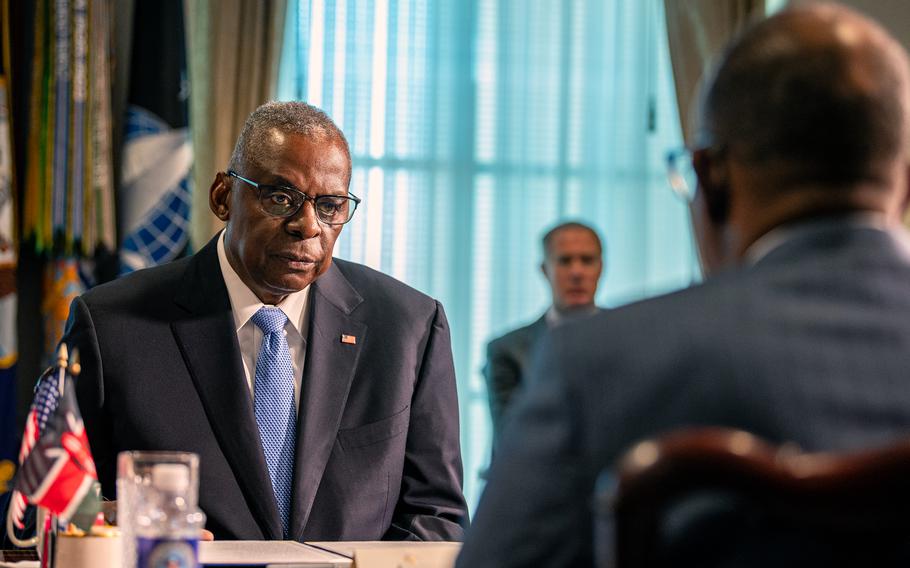
Defense Secretary Lloyd Austin at the Pentagon on Feb. 7, 2024. (Eugene Oliver/Department of Defense)
WASHINGTON — Defense Secretary Lloyd Austin has canceled his trip to Brussels on Tuesday to meet with NATO officials and discuss military aid for Ukraine after being rushed Sunday to Walter Reed National Military Medical Center where he is in critical care for symptoms related to a bladder problem, the Pentagon said.
“Secretary Austin will no longer travel to Brussels as originally scheduled. However, Wednesday’s Ukraine Defense Contact Group will continue, albeit virtually,” Air Force Maj. Gen. Pat Ryder, the Pentagon’s top spokesman, said Monday.
Austin, 70, was transported at about 2:20 p.m. Sunday to the hospital in Bethesda, Md., Ryder said. At about 4:55 p.m., Austin transferred the functions and duties to Deputy Defense Secretary Kathleen Hicks. Air Force Gen. Charles “CQ” Brown, chairman of the Joint Chiefs of Staff, the White House and Congress were notified.
Ryder told reporters during a briefing at the Pentagon that the White House was informed Sunday that Austin was going to the hospital. Congress received notification shortly afterward.
The Pentagon had announced last week that Austin would travel Tuesday with Brown to Brussels for an in-person meeting of the Ukraine group.
Doctors at Walter Reed said Sunday night that Austin was admitted to a critical care unit after a series of tests and evaluations. Doctors provided an update Monday that Austin underwent non-surgical procedures that required general anesthesia to address his bladder problem.
“We anticipate a successful recovery and will closely monitor him overnight. A prolonged hospital stay is not anticipated,” said John Maddox and Gregory Chesnut, doctors at the medical facility. “We anticipate the secretary will be able to resume his normal duties [Tuesday]. The current bladder issue is not expected to change his anticipated full recovery.”
It was not clear Monday how long Austin will remain in the hospital.
Austin had surgery in December for prostate cancer and was later hospitalized in January for complications from the procedure. However, he failed to provide proper notification to appropriate government officials.
Austin returned to the Pentagon on Jan. 29 after being absent from the building for nearly a month because of his health. The secretary had been released from Walter Reed on Jan. 15 after spending about two weeks there following the surgery, which was conducted Dec. 22.
But Austin faced public scrutiny after he failed to notify President Joe Biden and other government officials about his illness and hospitalization. His actions have sparked several reviews of what took place.
The Pentagon announced Thursday that it completed its internal review of Austin’s hospitalization, which the defense secretary is now reviewing himself. Austin is also scheduled to testify before the House Armed Services Committee on Feb. 29 about his failure to notify the needed officials about his illness.
He did address reporters at the Pentagon on Feb. 1 and apologized for not disclosing his prostate diagnosis, the surgery that followed and complications that led to an extended hospital stay.
“I want to be crystal clear: We did not handle this right. I did not handle this right,” he said. “I should have told the president about my cancer diagnosis. I should have told my team and the American people, and I take full responsibility.”
His cancer was discovered during a regular health screening in early December. He was admitted to the hospital about three weeks later for surgery, which required general anesthesia. He left the hospital the following morning.
On Jan. 1, Austin returned to Walter Reed after experiencing pain in his abdomen, hip and leg. He was later found to have a urinary tract infection, and Austin spent days in the intensive care unit before he was moved to a private section of the hospital.
But during Austin’s medical treatments, no one at the Defense Department notified the White House, Hicks, Congress or the public for several days.
On Jan. 2, Austin transferred some of his more pressing responsibilities to Hicks.
Austin said he had been experiencing fever, chills and shallow breathing on that day, and doctors decided to move him to the intensive care unit for several days of close monitoring.
Yet Biden did not learn of Austin’s prostate cancer until Jan. 9. That same day, the White House ordered all Cabinet members or secretaries must immediately notify the administration if at any time they cannot perform their duties.
Austin has said he did not direct anyone on his staff to conceal information about his health. He also said he has apologized to Biden for not immediately disclosing his diagnosis and treatment.